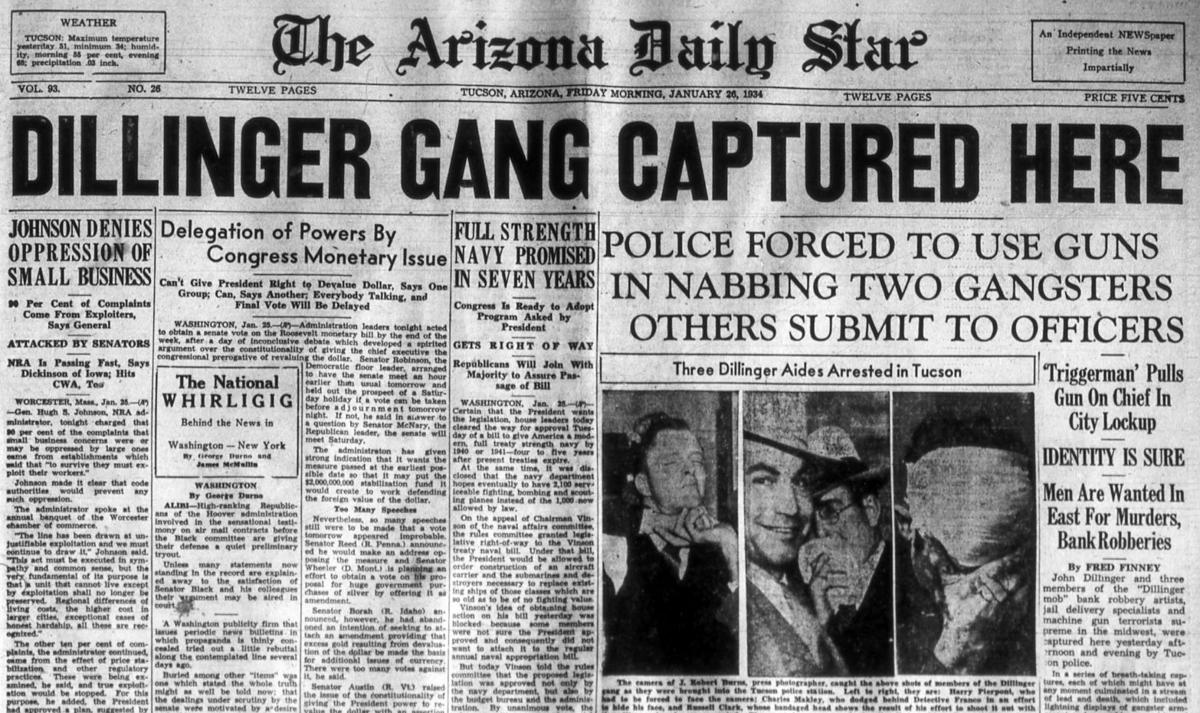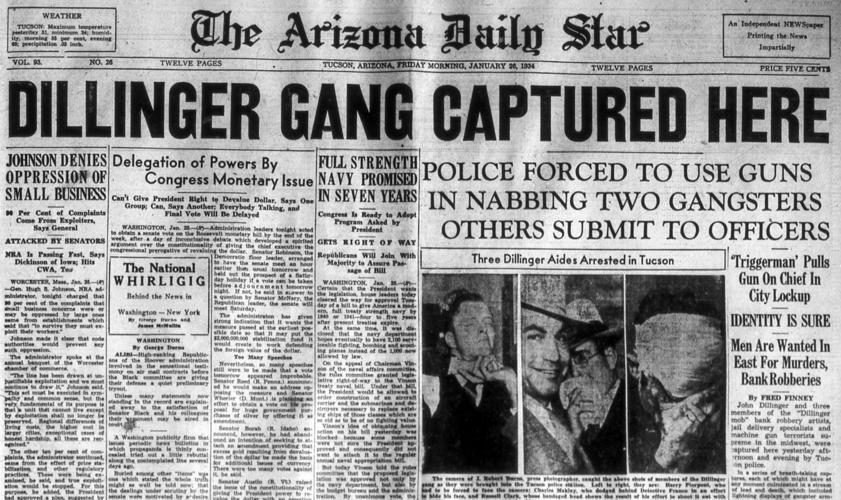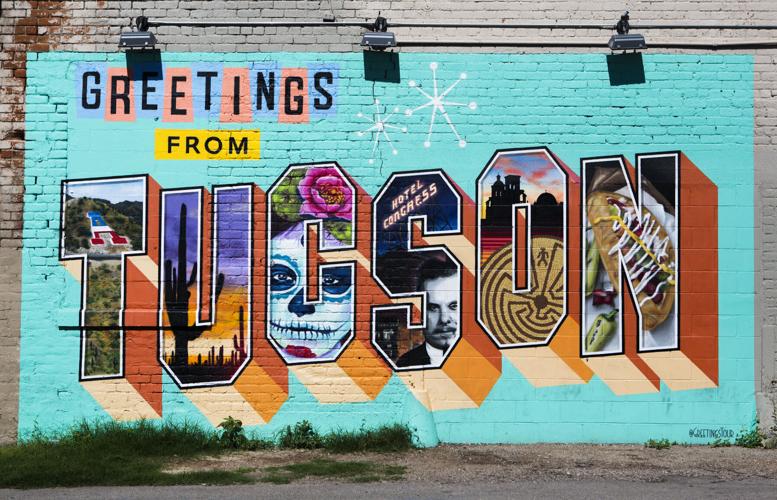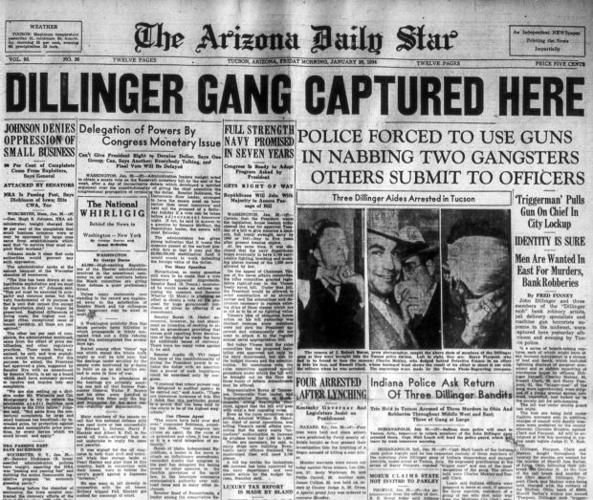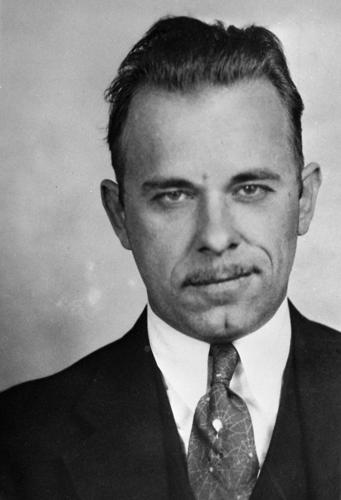Editor's note: This story was originally published on Jan. 11, 2022. We've since updated it with event details for the 2024 Dillinger Days held at Hotel Congress.
Nearly 90 years ago, John Dillinger and his notorious "Dillinger Gang" rolled through Tucson in an attempt to lay low from the law enforcement agencies that were hot on their tail after a series of bank robberies, murders and successful prison escapes. A little over one week, one hotel fire and several arrests later — history was forever changed right here in the Old Pueblo.
Here's everything you need to know about Dillinger's short but impactful stay in Tucson and how his infamous legacy impacted the city's cultural scene.
So the story goes…
A week before the Dillinger Gang's arrival in Tucson, the group robbed the First National Bank in East Chicago, Indiana, which led to the death of a local police officer. This incident was the last in a string of bank robberies and killings that led the gang to go on the run and keep a low profile from law enforcement, according to the FBI.
People are also reading…
The gangsters thought Tucson was the perfect place to hide out as they believed they would be able to slip through the fingers of local and national law enforcement agencies while here.
Dillinger and his three-man crew, including notorious criminals Harry Pierpont, Charles Makley and Russell Clark, arrived in Tucson around Sunday, Jan. 21, 1934, according to the Pima County Public Library's "Librarian Files." The men were joined by their female companions, including Dillinger's now-famous companion, Evelyn "Billie" Frechette. The Dillinger Gang rented a house located at 927 N. Second Ave. near East Speedway and North Euclid Avenue.

The home where John Dillinger stayed in 1934, 927 N. Second Ave. This photo was taken in 1983. John Dillinger, unaware that the others of his gang were in jail, was nabbed at sundown as he and his girlfriend strolled into the house on Second Avenue.
Supposedly, the house was undergoing a floor waxing, which led the gang to use aliases and book a one-night stay at Hotel Congress located at 311 E. Congress St., according to the "Librarian Files" at the Pima County Public Library.
On the night of Monday, Jan. 22, 1934, Clark was heard by hotel guests bragging about "how easy it was to make money by robbing banks with machine guns," according to the Greater Tucson Fire Foundation. Two of the guests who happened to be businessmen from New York City found Clark's demeanor disturbing and shared their concerns with the Tucson Police Department.
Less than 24 hours later, Hotel Congress would erupt into flames and the gangsters would be exposed to law enforcement.
The Hotel Congress fire and arrests of the Dillinger Gang

This 1923 American LaFrance Fire Engine, which responded to the 1934 fire at Hotel Congress, is being restored by the Greater Tucson Fire Foundation. A fire at the hotel flushed out three members of the gang, who were noticed by firefighters who remembered mug shots from detective magazines. A ruse pulled one of Dillinger's best gunmen into Police Chief C.A. Wollard's office. Dillinger surrendered to an officer who said, "Reach for the moon, or I'll cut you in half."
On Tuesday, Jan. 23, 1934, around 7:20 a.m., a fire was reported in the basement of Hotel Congress due to a "defective oil furnace" that "ignited an adjacent stack of aged firewood," according to the Greater Tucson Fire Foundation.
The fire ripped through the hotel, causing hundreds of guests to evacuate the building. Guests on the third floor, including Clark and Makley, were evacuated with a fire ladder. Once the men were safely removed from the hotel, they tipped two Tucson firefighters $12 to retrieve their luggage. According to the Greater Tucson Fire Foundation, the firefighters, William Benedict and John Freeman, noted that their luggage was extremely heavy upon the retrieval.
The firemen later recognized the gangsters from an issue of "True Detective Mysteries" magazine that exposed the Dillinger Gang and all of their crimes in the Midwest. The recognition led the firemen to report Clark and Makley to the Tucson Police Department.
Two days later, on Thursday, Jan. 25, 1934, little to Dillinger's knowledge, his gang was arrested by Tucson police officers in various parts of the city throughout the day. By 6:30 p.m. that day, Dillinger was the last gangster to be detained as he arrived at the Second Avenue home.
Reportedly, upon his arrest, Dillinger said, "Well, I’ll be damned."

Arizona Daily Star front page on events surrounding the capture of John Dillinger and his gang in January, 1934.
The nation's "Public Enemy No. 1" was finally captured.
The Tucson Police Department confiscated three Thompson submachine guns, two Winchester rifles, five bulletproof vests and over $25,000 in cash, according to the FBI's John Dillinger database. Tucson police officers also found a bulldog puppy, according to a story by the Arizona Daily Star.
(The FBI has a whole case file of Dillinger-related telegrams and other internal Bureau of Investigation paperwork from his time in Tucson that you can check out here. Note that the BOI didn’t become the FBI until 1935, a year after Dillinger's detainment in Tucson.)
The men were arraigned in "Room 8" at the Pima County Justice Court on Friday, Jan. 26, 1934. Soon after their arraignment, Dillinger was extradited to Crown Point, Indiana, to face charges for the murder of a policeman during a robbery. However, Dillinger escaped from a Crown Point prison a month and a half after his arrival.
Although the gang could not evade capture here in Tucson, in an issue of the Arizona Daily Star, one of the gangsters lauded Tucson police for their work. Regarding the police department, Pierpont said, "Smartest cops we have seen. Arizonans gentlemen, but Midwesterners are rats."

The front page of the Arizona Daily Star on Jan. 28, 1934.
Dillinger was eventually caught and killed by federal law enforcement agents on July 22, 1934, in Chicago.
Even though Dillinger and his gang's stay in the Old Pueblo was brief, his iconic crooked smile and infamous legacy forever altered Tucson's history and cultural scene.
Dillinger's impact on Tucson
From Tommy guns to bars to murals, the impact of Dillinger's capture lingers around the city 90 years after his quiet arrival and dramatic departure.
Tucson is still the home to one of Dillinger's Tommy guns that were confiscated during his arrest here in the mid-1930s. The submachine gun sits behind glass in the Tucson Police Department's police headquarters at 270 S. Stone Ave.
In 2016, the town of Peru, Indiana, asked Tucson to send the Tommy gun back to them as they argued that it was a part of their town's history. At the time, Tucson Police Department Sgt. Pete Dugan said, "We understand it's a big part of their history, but it's also a big part of Tucson's history," the Arizona Daily Star reported.

John Dillinger
Additionally, Tucson is home to one of the more unique Dillinger artifacts — a jar of his chewed-up bubble gum. The glass jar sits on display at the University of Arizona's Coit Museum of Pharmacy & Health Sciences, formally called the History of Pharmacy Museum. The gum was collected by a local pharmacist who worked at the Owl Drug Store, after he noticed that Dillinger had been in the store during his stay in Tucson and often left his chewed-up gum underneath the countertop. The jar was later donated to the museum by the pharmacist.
In the social and art scene, you can spot visuals of the notorious gangster rocking earphones and sunglasses in the now-closed Dillinger Brewing Company's logo.
You can also catch a glimpse of Dillinger in the popular "Greetings from Tucson" mural by Victor Ving on the backside of Miller's Surplus, located on the corner of East Seventh Street and North Arizona Avenue. Dillinger appears in the bottom half of the "S" in Tucson.

John Dillinger can be seen in the letter "S" on the "Greetings from Tucson" mural at 406 N. Sixth Ave.
Of course, the most significant way that Tucson remembers Dillinger's stay in Tucson is through Hotel Congress' annual Dillinger Days event.
The historic hotel has hosted the event for three decades. The event encapsulates Dillinger's capture through a series of reenactments and lectures. Typically, there are plenty of vintage cars and live music for event-goers to check out, too.
This year, a Dillinger Speakeasy will take place at 7 p.m. Saturday, Jan. 20 for $15 per person. The annual free Dillinger Days reenactments are set to take place at 10 a.m. Sunday, Jan. 21.
While Dillinger's visit to Tucson was short-lived, his impact has lasted 90 years as the city keeps the spirit of the gangster's historic capture alive through bars, murals and events influenced by his eventful time here in the Old Pueblo.



